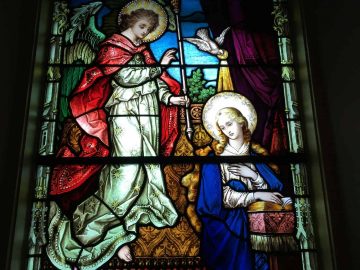Originally hailing from Houston, Texas, Franciscan Sister of Christian Charity Sister Marie Kolbe Zamora writes a series of articles on Baptismal Consecration. She holds an S.T.B., S.T.L. in Dogmatic Theology, and S.T.D. from the Pontifical Gregorian University,  specializing in Bonaventure and Ecclesiology.
specializing in Bonaventure and Ecclesiology.
At our Baptism, Jesus Christ claims us for His own. This is true of all of the Baptized, not just of Sisters and Priests. Furthermore, we are not consecrated merely to KNOW certain things, leading us to focus nervously on “learning our faith.” Nor are we consecrated merely to DO certain things, leading us to focus nervously on making moral choices. At our Baptism, Jesus consecrates us for Himself as BELONGING to HIM.
To say that Jesus claims us for Himself could bring to mind a “power claim” implying slavery, after all, we are taught that we need to be independent and self-reliant. Our training might make it so that when we think of ourselves as “belonging” to Jesus, we think of ourselves as being demeaned in some way. If we belong to Jesus, we must obliterate ourselves.
However, when Jesus claims us for Himself, He does so in and for LOVE and not as a show of power; as a result, Jesus does not desire our obliteration. Jesus desires US to be his partner in a loving relationship, which means that we may not obliterate ourselves. Belonging to Jesus Christ is a matter of LOVE and not of slavery; it engages the uniqueness of our person and our freedom. Embedded within our Baptism, therefore, is an invitation to use our freedom to surrender to Jesus’ consecration of me to / for himself.
 Again, our training might make it seem as though “freedom” and “surrender” are mutually exclusive. Our deepest selves, however, know that the best, deepest, most lasting freedom is freedom that can surrender, even surrender to that which causes us pain.
Again, our training might make it seem as though “freedom” and “surrender” are mutually exclusive. Our deepest selves, however, know that the best, deepest, most lasting freedom is freedom that can surrender, even surrender to that which causes us pain.
In the Gospels, each and every time Jesus Christ invites someone to follow Him or collaborate with Him, He presents them with an all or nothing choice: they may choose to belong to HIM, or to choose to belong to themselves. This is dramatically true of Mary and Joseph, both of whom choose to belong to God and, therefore, embrace of life of uncertainty and even anguish as a result of their “yes.” Read the first couple of chapters of Matthew’s Gospel for a reminder of how true this is. The same is true of the Apostles, the wealthy young man, the Pharisees, or the woman who touches the hem of his garment and is healed. At the other end of the spectrum, Herod provides a violent example of what it means to choose self over God.
Where are we in relationship to this invitation? Do we hesitate to acknowledge or accept this invitation? Are we living our faith “on the surface?” Do we desire more?
On the surface, choosing to belong to ourselves looks and feels like life because our psyches are comforted by our achievements and our plans. However, deep down we know that choosing ourselves deals ongoing death to us and to all those around us. We don’t need God to tell us that this is how it is; we experience the “death” that the selfishness of others causes us. With some humility, we become aware of the “death” that our selfishness causes others. Placing others first always means placing ourselves last. This is as true of our friends as it is true of God. We cannot BOTH be first. Choosing “me first” means choosing God (who is our life) last. Jesus reminds us how foolish it is to choose ourselves ahead of God when he says “Whoever finds his life will lose it …” (Matt. 10.39)
 It is true that choosing to belong to Christ looks and feels like death because it requires us to abandon ourselves and to cut ties with attitudes that keep us “hooked” on ourselves. We must indeed lose our lives … but not blindly. “Whoever … loses his life for my sake will find it.” (Matt. 10.39) When, by the grace of the Holy Spirit, we are able to lose our lives for the sake of Jesus Christ, Jesus assures us that we find our lives, for Jesus moves in and lives His own life within us. Jesus living His own divine life with us . . . THIS is the gift that we have received at our Baptism.
It is true that choosing to belong to Christ looks and feels like death because it requires us to abandon ourselves and to cut ties with attitudes that keep us “hooked” on ourselves. We must indeed lose our lives … but not blindly. “Whoever … loses his life for my sake will find it.” (Matt. 10.39) When, by the grace of the Holy Spirit, we are able to lose our lives for the sake of Jesus Christ, Jesus assures us that we find our lives, for Jesus moves in and lives His own life within us. Jesus living His own divine life with us . . . THIS is the gift that we have received at our Baptism.
On the Cross, Jesus made an all or nothing choice in our favor so that He might be able to live his divine life within us, and He communicates this divine life to us at our Baptism. May each one experience this great Baptismal gift, and may each one desire to seek, serve and belong to the Lord Jesus with all that we are.
-Sister Marie Kolbe Zamora, OSF, S.T.D.
smkolbeschol@gmail.com


